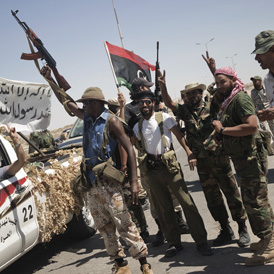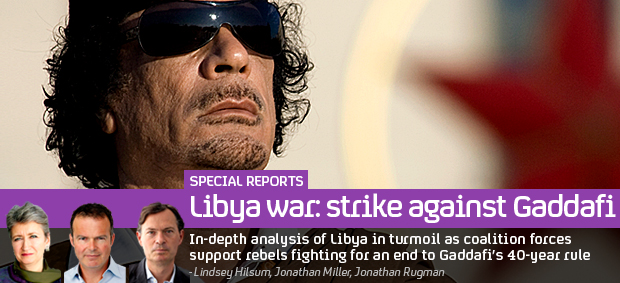Libya: Rebels close in on Tripoli
Six months after the war began Libyan rebels seem to be closing in on Tripoli. But would the fall of the capital lead, as one Libyan activist claims, to a “peaceful implosion” of the regime?

Opposition forces say they have taken large parts of the key city of Zawiyah, which is 30 miles west of Tripoli. It comes a day after rebels seized the city of Garyan in the south.
Libyan activist Ashour Shamis told Channel 4 News that Zawiyah is a significant milestone for the rebels, not only because of its oil refinery, but as the main route between Tripoli and Tunisia.
“It’s very significant for the rebels. They took most of it but they still haven’t got control of the eastern part of it near Tripoli. They’re not making their way into that part because of the concentration of Gaddafi forces,” he said.
‘Symbolic and military gain’
But Shashank Joshi, an associate fellow with the Royal United Services Institute, told Channel 4 that it’s still not clear if the oil refinery is in rebel hands.
“If they have taken it, it’s a massive morale boost given its proximity to Tripoli, but also because they lost it after capturing it earlier.
“So it would be a huge symbolic as well as military gain,” Mr Joshi said.
‘Decisive phase’
Rebels say they are in a “decisive phase” and are confident they can claim victory by the end of the month.
There are organised people inside the city but they are not moving at the moment. They’re aiming for peaceful implosion and peaceful surrender of Tripoli. Ashour Shamis, Libyan activist
The opposition has always maintained that if they can reach the Gaddafi stronghold of Tripoli, then supporters across the city would rise up and turn on the Gaddafi regime.
Mr Shamis told Channel 4 that the plan is to have “no bloodshed at all”.
“It should come easily. There are organised people inside the city but they are not moving at the moment.
“They’re aiming for peaceful implosion and peaceful surrender of Tripoli. It could happen if there’s enough defections and people lay down their arms and walk away.”
Garyan a ‘significant prelude’
He pointed to the fall of Garyan as “a significant prelude” for how Tripoli could be taken peacefully by rebels.
But RUSI’s Shashank Joshi warned of the potential for “prolonged fighting and bloodshed” if fighting broke out in urban parts of the city.
Nato is going to have to tread carefully as it pushes forward. It’s an incredibly difficult task. Shashank Joshi, associate fellow at RUSI
“They’d face enormous resistance, even at the edge of the city outskirts. It’d be an inconclusive battle.”
He said Nato faces several challenges as its mandate in Libya draws to a close next month.
“Nato is going to have to tread carefully as it pushes forward.
“It’s an incredibly difficult task. It has a lot of information at its disposal, but even so, when rebels take control of areas, there’s trouble identifying rebels from government forces.”
Nato have confirmed that Libyan government forces launched a Scud-type missile for the first time in the six-month civil war on Sunday.
‘Not involved’ in talks
The former Jordanian foreign minister, Abdel-Elah al-Khatib, said he was meeting representatives of both sides as part of UN-brokered talks in Tunisia.
But Libya’s rebel National Transitional Council have denied being involved in any negotiations with Gaddafi ministers.
Mr Joshi said even if opposition forces were remaining tight-lipped about talks, it was “sensible” to explore options to reduce the bloodshed.
“If there’s any possibility of working with pragmatic elements of the regime to see Gaddafi go peacefully instead of Tripoli going down in a hail of bullets, then exploring that is sensible,” he said.
The international community have moved to end diplomatic relations with the Gaddafi regime, with many recognising the National Transitional Council as the country’s legitimate government.
Speaking in Washington on Tuesday, US Defense Secretary Leon Panetta said the Gaddafi regime’s “days are numbered”.
